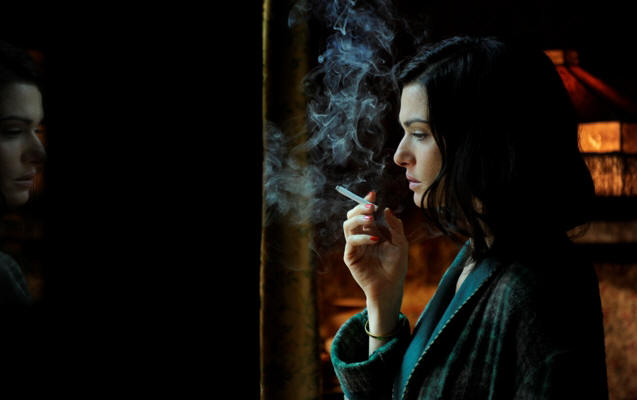MOVIE REVIEWS |
INTERVIEWS |
YOUTUBE |
NEWS
|
EDITORIALS | EVENTS |
AUDIO |
ESSAYS |
ARCHIVES |
CONTACT
|
PHOTOS |
COMING SOON|
EXAMINER.COM FILM ARTICLES
||HOME


Friday, March 30, 2012
MOVIE REVIEW
The Deep Blue Sea
A Well-To-Do Woman At An Impasse, In '50s London

Rachel Weisz as Hester Collyer in Terence Davies' drama "The Deep Blue Sea",
based on Terence Ratigan's play. Music Box
by
Omar P.L. Moore/PopcornReel.com
 FOLLOW
FOLLOW
Friday, March 30,
2012
Terence Davies returns after an eleven-year break
from feature film directing, and triumphantly -- although that may be a hollow
word given the lugubrious nature of his work. The director's latest drama,
"The Deep Blue Sea" expanded its release today to additional U.S. cities.
Based on Terence Ratigan's play set in 1950s London, "The Deep Blue Sea" plumbs
the depths of the emotional anguish of Hester Collyer (Rachel Weisz).
Hester is a married, upper class woman stuck in a polite but rootless existence
with wealthy husband and respected judge Sir William Collyer (Simon Russell
Beale), a bland, gentle older man. As the out-of-sequence film opens
Hester has an epiphany of the heart. In several beautiful elliptical shots
we see Hester enveloped in complete bliss and love, physically enmeshed and
reborn in a smoldering intimate relationship with Freddie (Tom Hiddleston), a
younger, wayward former Royal Air Force pilot.
Hester is so deeply smitten she calls it curtains in her marriage but is trapped
betwixt and between when Freddie starts to drink excessively, alienating her.
The two lovebirds evoke the tragic forbidden lovers of David Lean's "Brief
Encounter" (1945), and Mr. Hiddleston, plucky and potent here, uncannily
resembles Trevor Howard, and Ms. Weisz has the penetrating eyes, unyielding
strength and luminosity of Celia Johnson. In this moody adaptation Mr.
Davies meshes class, sexuality, ambiguity and secrecy effortlessly, and his
screenplay tangles and traces the fine lines between each. The
cinematography by Florian Hoffmeister is fluid but deliberate, careful and free.
There's a smoky, muted flavor to "The Deep Blue Sea", which marinates in its
somber 1950s atmosphere so very well. Evocative, cool and musty, Mr.
Davies' drama features a woman caught between the strong passions of her heart
and the security of financial support and friendship. The singular
character of the film is the period from which it comes: the cautious,
conservative post-war 1950s, where people did what was expected of them and
rituals were adhered to. Adultery was an even more explosive taboo scandal
in the 50s -- but only for any woman who dared commit it. Hester's last
name may as well have been Prynne. As Hester pines, lovesick, suicidal and
distraught at her predicament, you can almost visualize the "A" imprinted on her
bosom.
Ms. Weisz is proficient at playing resolute, well-drawn characters who have to
make tough choices while defending them audaciously, whether in "The Constant
Gardner" or
"The Whistleblower", the latter based on true
events. Here, the Oscar-winning actress does the same, conveying torment
and turmoil in a cerebral and physical manner. Watch the small things Ms.
Weisz does here, especially when silent. Hester is a woman living in her
own time while firmly aware of the time she swirls around in. Ahead of her
time, Hester charts a course that frees her but also breaks her heart.
Where is Hester's true happiness? Is it in finding a new lease on life, or
in having released herself from suffocation? The tragedy is that Hester is
suffocated anyway, by the result of her choice. She's isolated and boxed
in, and knows she can't live in both worlds offered by two very different men.
A landlady who pities Hester's situation tries to cheer her up by saying words
to the effect of, "love is cleaning someone's messy behind." It's a moment
of subdued comic relief in a stifling, claustrophobic film, but many a truth is
spoken in jest.
The British-born Mr. Davies has always focused on outsiders, typically the lower
classes and the voiceless in his films. He is interested in giving them a
full hearing as they navigate against the tide of dominant voices of the day.
The director is of the 1950s, and as in prior films including "Distant Voices,
Still Lives", gives texture and substance to his central figures who are
complex, fertile and plain-spoken. Ms. Weisz fits the bill perfectly, as
does the supremely able cast, all very good, particularly Ann Mitchell as the
landlady Ms. Elton, and Mr. Russell Beale, ever restrained as Judge Sir William.
"The Deep Blue Sea" has at its core a meditative anthem for a tortured angel
whose wings are clipped even as her heart flutters to the heavens of new love.
Watching Mr. Davies' film isn't an uplifting experience but "The Deep Blue Sea"
isn't about happiness. The film is about the depths of despair resulting
from happily making your bed and lying in it, whether or not you can swim
through the thorny consequences without drowning. For Hester, that won't
be easy at all.
With: Harry Hadden-Paton, Barbara Jefford, Sarah Kants, Jolyon Coy, Oliver
Ford-Davies.
"The Deep Blue Sea" is rated R by the Motion Picture Association Of America for
a scene of
sexuality and nudity. The film's
running time is one hour and 38 minutes.
COPYRIGHT 2012. POPCORNREEL.COM. ALL RIGHTS RESERVED.  FOLLOW
FOLLOW
MOVIE REVIEWS |
INTERVIEWS |
YOUTUBE |
NEWS
|
EDITORIALS | EVENTS |
AUDIO |
ESSAYS |
ARCHIVES |
CONTACT
| PHOTOS |
COMING SOON|
EXAMINER.COM FILM ARTICLES
||HOME


 FOLLOW
TWEET
FOLLOW
TWEET FOLLOW
FOLLOW